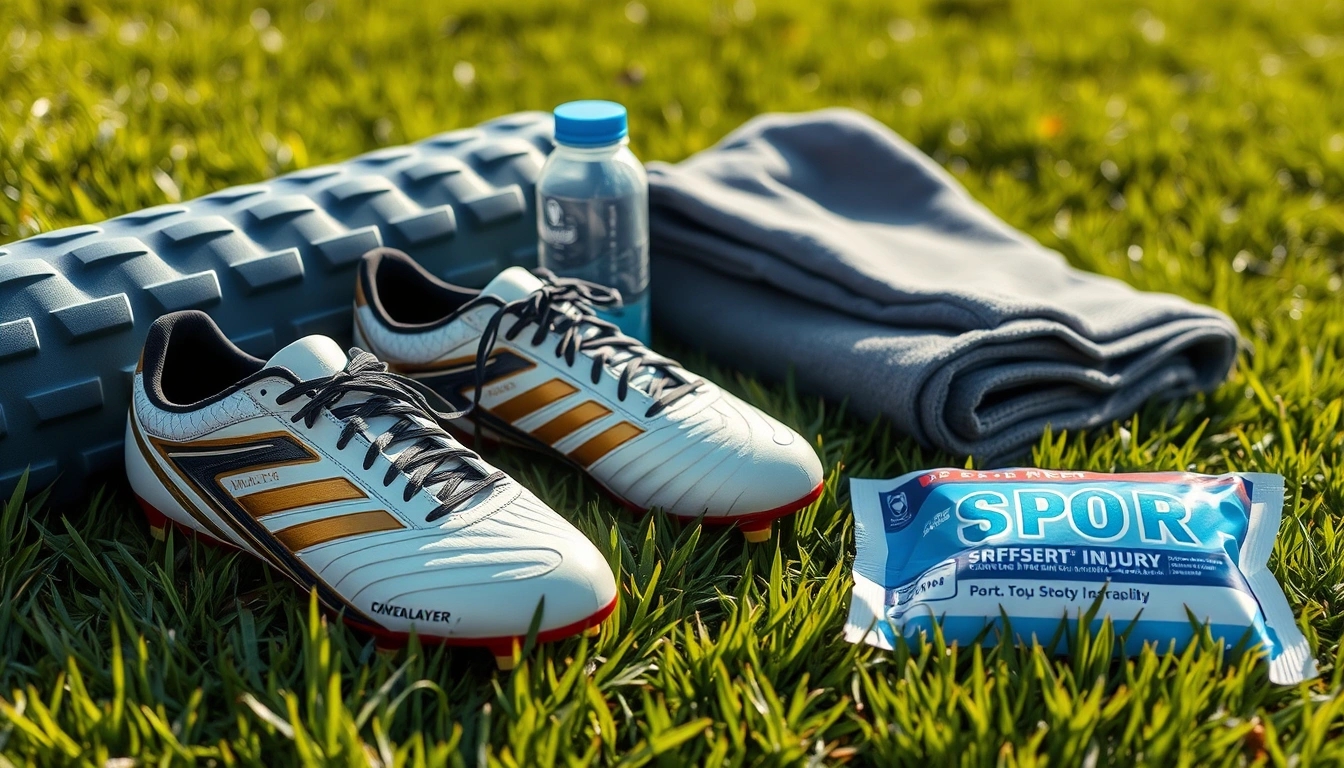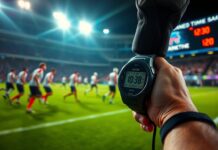Alright, so you’ve just dragged yourself off the pitch after one of those brutal Sunday League matches — you know the kind where every muscle in your body is screaming and you feel like a walking zombie for the rest of the day. Well, guess what? Recovery isn’t just for the pros. Even if you’re just out there for the love of the game (or to show off to your mates), bouncing back properly can make all the difference. No more hobbling around or nursing mysterious aches for days on end. Let’s dive into some practical and effective recovery strategies that’ll have you ready to smash the next game without feeling like you got hit by a truck.
Why bother with recovery at all?
You might be thinking, “I’m just playing for fun, why do I need to stress about recovery?” Well, here’s the deal: ignoring recovery can lead to injuries, fatigue, and worse performance next time. Even if you’re not aiming for the Premier League, your body still needs some TLC after 90 minutes of chasing down the ball, dodging tackles, and sprinting like your life depends on it. Proper recovery means less downtime, fewer aches, and more goals (or at least fewer embarrassing slips).
| Common Recovery Mistakes | Why They’re Bad |
|---|---|
| Skipping hydration | Dehydration slows muscle repair and leaves you drained |
| Ignoring soreness | Minor injuries can become major if untreated |
| Crash resting all day | Complete inactivity can stiffen muscles and delay recovery |
Hydration: The unsung hero
Look, we all know water’s important, but after a sweaty Sunday game, just gulping a glass or two won’t cut it. Your body’s lost a ton of fluids and electrolytes — not to mention the salt that makes you taste like a chip shop. Sports drinks can help here, but don’t go overboard with the sugar bombs. Aim for consistent sipping rather than a firehose approach. Your muscles will thank you.
Stretch or rest? The eternal dilemma
You’ve heard it a million times: stretch to prevent stiffness. But sometimes, all you want is to crash on your couch and binge-watch your favorite show. So, what’s the best move? The answer: a bit of both. Gentle stretching right after the match helps release tight muscles, but don’t overdo it — your body needs rest too. Later in the day, some light movement like walking or yoga can keep things loose without exhausting you.
- Post-match: 10 minutes of light stretching focusing on hamstrings, quads, and calves
- Later: 20-30 minutes of walking or easy cycling
- Rest: Prioritize sleep (more on this later)
Nutrition hacks for muscle repair
Eating after a game isn’t about shoving down pizza (tempting as it is). Your muscles need protein to rebuild and carbs to refill energy stores. Timing is key: try to eat a balanced meal within 30-60 minutes post-match. Think chicken, rice, veggies — or if you’re in a rush, a smoothie with protein powder and fruit can do wonders. Avoid junk food that’ll just leave you sluggish.
Post-Match Meal Ideas:- Grilled chicken with quinoa and steamed broccoli- Tuna sandwich on whole grain bread with salad- Greek yogurt with berries and a handful of nuts
Ice baths: torture or treasure?
Some swear by dunking themselves in freezing water after a match. Others say it’s pure agony. Science is a bit mixed here, but cold therapy can reduce inflammation and muscle soreness — if you can handle the chill. If ice baths aren’t your thing, a cold shower or applying ice packs to sore areas can help.
Sleep: The ultimate secret weapon
Never underestimate the power of quality sleep. It’s like hitting the reset button for your body and brain. Aim for 7-9 hours, and if you can sneak in a nap, even better. Sleep boosts muscle repair, hormone balance, and overall energy — all crucial for Sunday’s showdown.
Active recovery & foam rolling
Moving gently after a game might sound like a cruel joke, but light jogging or walking helps flush out toxins and promotes healing. Also, foam rolling is your DIY masseuse — it works out knots and tight spots without breaking the bank.
| DIY Recovery Tools | Benefits |
|---|---|
| Foam roller | Relieves muscle tightness and improves blood flow |
| Massage balls | Targets specific knots and trigger points |
| Stretch bands | Enhances flexibility and muscle elongation |
Bottom line? Recovery isn’t just a boring chore — it’s your ticket to staying fit, injury-free, and ready to keep smashing those Sunday League matches. So, drink up, stretch smart, eat well, sleep lots, and maybe—just maybe—try that ice bath without screaming. Your body will thank you next weekend.
Why recovery matters in Sunday League football
Alright, let’s get real for a minute. Sunday League football isn’t the Premier League, but that doesn’t mean your body doesn’t feel like it just ran a marathon through a brick wall after 90 minutes on the pitch. Whether you’re chasing glory or just trying not to trip over your own feet, recovery is absolutely crucial. You might think, “Eh, I’m just playing for fun, no need to fuss.” But guess what? Ignoring recovery is like driving your car without oil — eventually, things start to grind, and injuries sneak up like uninvited guests.
Think about it: after a match, your muscles are screaming, your joints are creaky, and your energy tanks are as empty as your mate’s promises to turn up on time. Recovery helps your body repair the microscopic damage done during the game, reducing soreness and prepping you for the next Sunday showdown. Skipping it? Well, you’re basically signing up for a season of hobbling around and wondering why your hamstring feels like it’s auditioning for a horror movie.
| Benefit | Why It Matters |
|---|---|
| Injury Prevention | Proper recovery reduces muscle fatigue and tightness, lowering the risk of strains and sprains. |
| Improved Performance | Allows muscles to rebuild stronger, so you’re faster, sharper, and less likely to gas out. |
| Better Mental Focus | Rest and recovery help clear the mind, reducing stress and improving decision-making on the pitch. |
Now, don’t be fooled into thinking recovery means just flopping on the couch with a bag of crisps (though, hey, no judgment if you do that too). There’s a science to it — hydration, nutrition, gentle stretching, and yes, sometimes even a bit of active movement. The goal is to help your body flush out toxins, repair muscle fibers, and restore energy stores.
- Hydration: Water is your best mate here. Sweat out all that effort, and you gotta put those fluids back in.
- Nutrition: Protein and carbs post-match? Not just gym rat talk — it really helps muscle repair.
- Stretching: Keeps muscles loose and prevents that stiff “I can’t move” feeling the next day.
Seriously, even if you’re just mucking about for kicks, treating recovery like an afterthought is a rookie mistake. The last thing you want is to be sidelined with a niggle because you thought “I’m only Sunday League, it’s no big deal.” Spoiler alert: it is a big deal. Your body doesn’t care if you’re playing for a trophy or a pint — it demands respect and care, or it’ll make you pay.
So, next time you’re dragging yourself home after the final whistle, don’t just crash and hope for the best. Take a moment, sip some water, stretch those legs, and maybe even grab a decent meal. Your future self, hobbling less and feeling better, will thank you big time.
Hydration: The underrated hero
Alright, let’s get one thing straight — after 90 minutes of leg-burning, lung-busting Sunday League football, gulping down a random glass of water just won’t cut it. You might think, “I’m not running a marathon here, it’s just a kickabout,” but trust me, your body is sweating buckets and losing way more fluids than you realize. And no, that pint of beer post-match doesn’t count as hydration — sorry to break it to you.
Most players seriously underestimate how much they actually need to drink once the final whistle blows. It’s not just about quenching thirst; it’s about replacing lost electrolytes and rebalancing your body’s fluid levels. Water is great, but sometimes a good sports drink packed with sodium, potassium, and magnesium is the better pick, especially if you’ve been sweating profusely or playing in scorching heat.
| Fluid Type | When to Use | Why It Matters |
|---|---|---|
| Water | For light sweating or short matches | Replenishes lost fluids, simple and effective |
| Sports Drinks | For heavy sweating or matches over 60 minutes | Replaces electrolytes and carbs, boosts energy |
| Chocolate Milk (yes, really!) | Post-match recovery drink | Protein + carbs combo aids muscle repair |
Now, here’s a fun fact: your body can lose up to 2-3 liters of fluid during a match, and if you don’t replace that, you’re basically asking for cramps, dizziness, or worse — a trip to the sidelines before you even get to celebrate a goal. Some folks think chugging a ton of water right after the game is the way to go, but slow and steady wins the race here. Drinking too much too fast can leave you feeling bloated or nauseous, which nobody wants after a hard-fought 90.
- Tip 1: Weigh yourself before and after the match to estimate fluid loss.
- Tip 2: Aim to drink about 1.5 times the weight you lost in fluids over the next few hours.
- Tip 3: Don’t forget to sip fluids during the game when possible — hydration isn’t just a post-match thing.
And hey, if you’re the type who hates plain water — no judgment — try adding a splash of fruit juice or a pinch of sea salt to jazz it up. Or better yet, make your own DIY electrolyte drink with lemon, honey, and a sprinkle of salt. It’s cheap, natural, and way better than those overly sweet store-bought options.
In the end, hydration might seem like the boring, background player in your Sunday League saga, but it’s the real MVP. Skimp on fluids, and you’re asking for trouble — sluggish legs, poor focus, and a body that feels like it’s been run over by a bus come Monday morning. So, next time you lace up those boots, remember: water and sports drinks aren’t just optional extras; they’re the secret weapons in your recovery arsenal.

Stretching vs. resting: Finding the balance
Alright, so you’ve just dragged yourself off the pitch after a brutal Sunday League match. Your legs feel like jelly, your lungs are begging for mercy, and the couch is calling your name louder than your mates shouting for a post-match pint. Now, the big question: should you stretch it out like a yoga guru or just crash on the couch and call it a day? Spoiler alert: there’s no one-size-fits-all answer, but understanding when to do each can seriously up your recovery game.
First off, let’s talk about stretching. It’s tempting to think that a good stretch right after the game will magically undo all the muscle tightness and soreness. Well, kinda yes, kinda no. Gentle stretching can help increase blood flow and ease tight muscles, but going overboard with aggressive stretches right after the match might actually do more harm than good. Your muscles are tired and slightly inflamed, so forcing them into deep stretches can risk tiny tears or increased soreness.
| Do | Don’t |
|---|---|
| Perform light, static stretches targeting major muscle groups | Push to the point of pain or discomfort |
| Focus on calves, quads, hamstrings, and hip flexors | Attempt intense dynamic or ballistic stretches immediately |
| Hold stretches for 15-30 seconds | Ignore your body’s signals of tightness or fatigue |
Now, what about just crashing on the couch? Honestly, sometimes your body just needs to rest. After all, recovery isn’t just about moving; it’s about letting your muscles repair and your nervous system chill out. Sitting or lying down might feel lazy, but it’s essential for reducing inflammation and preventing burnout. However, beware of staying completely still for hours — that can lead to stiffness and slower recovery.
- Active rest is the sweet spot: think light walking, gentle cycling, or even just moving around the house.
- Combining short stretching sessions with periods of rest can keep your muscles happy.
- Listen to your body — if you’re feeling sharp pain, rest more; if it’s just dull tightness, a bit of stretching might help.
Here’s a quick rundown of when to stretch and when to rest:
| Condition | Recommended Action |
|---|---|
| Muscle tightness without pain | Gentle stretching + light movement |
| Sharp pain or injury suspicion | Rest + consult a professional |
| Feeling exhausted but no soreness | Prioritize rest, hydrate, and light stretching later |
In the end, recovery is a bit like your Sunday roast — it needs the right ingredients in the right amounts. Stretching and resting are both vital, but knowing when to pick one over the other can save you from hobbling around like a dodgy robot the next day. So next time you’re torn between the yoga mat and the sofa, remember: a little stretch here, a little rest there, and your body will thank you come next match day.
Nutrition hacks for quicker muscle repair
Alright, let’s cut the fluff: eating right after a Sunday League match isn’t some secret code only sports scientists know. But, believe it or not, what you shove into your mouth and when you do it can seriously speed up how fast your muscles bounce back. No, it’s not rocket science, but if you’re just grabbing a packet of crisps and a fizzy drink after the final whistle, you’re missing out big time.
First off, timing is everything. Your muscles are like sponges after a game, desperate to soak up nutrients and start the repair work. That golden window? About 30 to 60 minutes post-match. If you wait too long, your body’s efficiency in absorbing proteins and carbs drops off faster than your mate’s stamina in the last 10 minutes. So, don’t just plonk yourself on the couch scrolling through your phone – get some food in you.
- Protein is king: This is the building block for muscle repair. Think lean meats, eggs, dairy, or plant-based options like lentils and chickpeas.
- Carbs aren’t the enemy: They replenish your glycogen stores, which get wiped out after 90 minutes of running around like a headless chicken. Whole grains, sweet potatoes, and fruits are your pals here.
- Don’t forget fats: Healthy fats from nuts, seeds, or avocado can help reduce inflammation. But, keep it moderate – you don’t want to slow digestion.
Now, here’s a quick cheat sheet for a post-match meal that hits all the right notes:
| Food Group | Examples | Why It Helps |
|---|---|---|
| Protein | Grilled chicken, Greek yogurt, tofu | Repairs muscle fibers and supports recovery |
| Carbohydrates | Brown rice, quinoa, bananas | Replenishes energy stores |
| Fats | Olive oil, almonds, chia seeds | Reduces inflammation, supports overall health |
| Fluids | Water, coconut water, electrolyte drinks | Rehydrates and restores electrolyte balance |
But hey, don’t just eat blindly. Hydration plays a massive role here too. If you’re dehydrated, your recovery slows down like a snail on a sticky track. So pair your meal with plenty of fluids – water is great, but sometimes a sports drink with electrolytes can give you that extra kick.
One thing to watch out for: avoid heavy, greasy foods right after the game. Yeah, that double cheeseburger might sound like heaven, but it’ll sit in your stomach like a brick and make you feel sluggish. Your body’s already working overtime to fix your muscles—don’t make it juggle digestion drama on top of that.
In a nutshell, post-match nutrition is about giving your body the right fuel at the right time. It’s not about perfection or fancy supplements; it’s about simple, balanced meals that help your muscles recover faster so you’re not hobbling around on Monday like you just survived a war.
Quick tips to remember:
- Eat within an hour of finishing the match.
- Balance protein and carbs for best results.
- Stay hydrated – don’t wait until you’re parched.
- Skip the junk food; your muscles don’t need that drama.
So next time you’re done with your Sunday League heroics, think of your post-match meal as your secret weapon. Trust me, your legs will thank you on the pitch next weekend.
Ice baths and cold therapy: Do they really work?
Ah, ice baths — the love-hate ritual that divides Sunday League footballers like no other recovery method. Some players swear by plunging into a tub of icy water, claiming it’s the magic potion for healing sore muscles and bouncing back quicker. Others? Well, they call it straight-up torture and avoid it like the plague. So, what’s the real deal here? Let’s break it down without the fancy jargon and get to the heart of whether freezing your bits off is worth the hype.
First off, the science behind ice baths, or cold water immersion (CWI) if you want to sound posh at the pub, revolves around reducing inflammation and muscle soreness. When you smash it on the pitch for 90 minutes, your muscles get tiny tears and inflammation — that’s just how your body deals with the stress. Dunking yourself in cold water supposedly constricts blood vessels, which then dilate once you get out, flushing out toxins and easing swelling. Sounds neat, right? But, and here’s the kicker, the evidence is a bit all over the place.
| Pros of Ice Baths | Cons of Ice Baths |
|---|---|
| May reduce muscle soreness and perceived fatigue | Uncomfortable and can be painful to endure |
| Helps with inflammation by constricting blood vessels | Some studies suggest it might slow muscle repair |
| Popular among pro athletes and trainers | Not suitable for everyone (heart conditions, cold sensitivity) |
| Can improve recovery perception (placebo effect? Maybe!) | Time-consuming and requires preparation |
Now, don’t get me wrong, ice baths do have their fans — and it’s not just the hardcore athletes. Many Sunday League players report feeling less stiff and more ready for the next game after a quick dip. But others find the experience so brutal that the mental stress outweighs any physical benefit. Imagine sitting in near-freezing water for 10 minutes, shivering uncontrollably — sounds like a punishment, not a recovery method!
- Tip #1: If you’re curious, start slow. Try 5 minutes at first and see how your body reacts.
- Tip #2: Combine ice baths with other recovery methods like stretching and hydration for better results.
- Tip #3: Don’t ignore your body. If you feel dizzy or overly uncomfortable, get out immediately.
Another thing to consider is the timing. Jumping into an ice bath right after the match might feel great, but some research hints that immediately cooling muscles could blunt the natural repair process. So, if you’re training for gains or muscle growth, ice baths might actually slow you down a bit. But if your main goal is to just get back on the pitch and play again soon without hobbling around, cold therapy can be a handy tool.
In the end, ice baths are a bit like Marmite — you either love ’em or you hate ’em. They’re not a miracle cure, but they can be part of a smart recovery plan if used wisely. And hey, if nothing else, bragging rights for enduring the cold might just be worth it.
Quick recap:- Ice baths cold water immersion (10-15°C) for 5-10 mins- Benefits: reduced soreness, inflammation control, perceived recovery boost- Downsides: discomfort, possible slowed muscle repair, not for everyone- Best used as part of a balanced recovery routine, not a standalone fix
So, next time you’re debating whether to dive into that ice bath or just flop on your couch with a bag of chips, remember: it’s about what works for you, not what works for your mate down the pitch. And if you do give it a shot, prepare for some serious shivers — but maybe a faster comeback too.

Sleep: Your secret weapon
Look, if you think you can just gulp down a protein shake, stretch a bit, and call it a day after a brutal Sunday League match, think again. Sleep isn’t just some boring downtime — it’s the ultimate game-changer in your recovery toolkit. Imagine your body as a smartphone battery: you can’t expect it to last all day without plugging it in overnight. That’s what sleep does — it recharges your muscles, your brain, and your mood. No joke, skimping on sleep after a match is like trying to drive a car on fumes. You’ll feel sluggish, cranky, and your performance next week? Forget about it.
Now, here’s the kicker: not all sleep is created equal. You’re aiming for that deep, restorative sleep — the kind where your body is busy repairing muscle fibers torn during the game and flushing out all that nasty lactic acid. Plus, your brain? It’s sorting through all the chaos from the match, helping you process tactics, mistakes, and maybe even that embarrassing slip you tried to forget. The catch? If you’re tossing and turning, scrolling on your phone, or stressing about work, you’re sabotaging your own recovery.
What’s the magic number? Most experts say 7-9 hours is the sweet spot for adults, but honestly, after a punishing 90 minutes of chasing down strikers and lunging for tackles, you might need a bit more. Think of it as giving your body that extra time to hit the “reset” button properly. And no, a quick nap while watching reruns doesn’t quite cut it — though it’s better than nothing.
| Sleep Stage | What Happens | Why It Matters for Recovery |
|---|---|---|
| Deep Sleep (Slow Wave) | Muscle repair and growth hormone release | Essential for healing those tiny muscle tears and reducing inflammation |
| REM Sleep | Brain activity and memory consolidation | Helps with mental recovery and processing the day’s events |
| Light Sleep | Transition between wakefulness and deep sleep | Prepares body for restorative phases |
But hey, if you’re the type who likes to party hard on Saturday night or binge-watch the footy highlights until 2 AM, don’t expect miracles come Sunday afternoon. Your body will be screaming, “What the heck, mate?” and you’ll be lucky to make it through the match without feeling like a zombie. So, here’s a quick checklist to help you catch those crucial Zzz’s:
- Stick to a routine: Try to hit the sack and wake up at the same time every day, even on Sundays.
- Limit screen time: Blue light from phones and TVs messes with your melatonin, the sleep hormone.
- Create a chill environment: Dark, cool, and quiet rooms are your best friends.
- Avoid heavy meals and caffeine: Both can keep you tossing and turning.
And if you’re still struggling to get quality sleep, don’t just shrug it off. Toss in some relaxation techniques like deep breathing or gentle stretches before bed. Or better yet, treat yourself to a warm bath — it’s like telling your body, “Hey, time to unwind now.”
In the grand scheme of Sunday League football, where the glory isn’t quite Premier League but the bruises sure feel real, sleep is the unsung MVP. Skip it, and you’re basically handing your opponents a free win before the whistle blows. So next time you’re tempted to stay up scrolling through memes or re-watching that goal you scored, remember: your best performance starts with a solid night’s sleep.
Active recovery: Moving without moving much
You might be thinking, “After 90 minutes of leg-busting, why the heck would I want to jog or walk more?” Trust me, that knee-jerk reaction to just flop down on the couch and binge-watch your favorite series is totally normal. But here’s the kicker: active recovery—which is basically moving, but without turning into a sweaty mess again—actually helps your body bounce back faster than just lying there like a limp noodle. Sounds a bit bonkers, right? But science and plenty of Sunday League warriors back it up.
Let’s break it down. When you’re done with a match, your muscles are full of tiny tears and metabolic waste like lactic acid. Sitting still means those toxins hang around longer, making you stiff and sore the next day. Instead, a gentle walk or light jog helps boost blood flow, flushing out those nasties and delivering fresh oxygen and nutrients to your muscles. It’s like giving your body a little nudge to start the repair process.
- Why not just rest? Because complete rest slows down circulation, which can increase stiffness.
- How long should you move? Around 10-20 minutes at a light pace, nothing too intense.
- When to do it? Ideally within an hour after your match, or the next day if you’re totally wiped out.
| Active Recovery Activity | Benefits | Recommended Duration |
|---|---|---|
| Light jogging | Increases blood flow, reduces muscle soreness | 10-15 minutes |
| Walking | Gentle movement, promotes circulation | 15-20 minutes |
| Swimming or cycling (easy pace) | Low-impact, great for joints | 20-30 minutes |
Now, don’t get me wrong, this isn’t about pushing yourself to the brink again. It’s the “slow dance” of recovery—easy, chill, and purposeful movement. If you’re hobbling around like a zombie, maybe skip the jog and stick to a stroll. And hey, if you feel any sharp pains, stop immediately. Nobody wants to turn a recovery session into a trip to the physio.
Here’s a quick pro tip: combine your active recovery with some light stretching or foam rolling. It’s like giving your muscles a double whammy of TLC. Stretching helps maintain flexibility, while rolling out those tight spots can prevent cramps and stiffness.
In summary:
- Active recovery isn’t a cruel joke; it’s a legit way to speed up healing.
- Keep it light and easy—no need to break any speed records.
- Timing matters—try to get moving soon after the match or the next day.
- Pair movement with gentle stretching or foam rolling for best results.
So next time you’re tempted to just crash after a Sunday League brawl, consider lacing up for a slow jog or a casual walk instead. Your muscles will thank you, and you might just surprise yourself by feeling fresher come next weekend. Who knew moving without moving much could be the secret weapon in your recovery arsenal?
Foam rolling and self-massage techniques
Alright, let’s get real about those stiff muscles and stubborn knots that sneak up on you after a Sunday League match. You know the feeling—legs tighter than your gran’s purse strings and shoulders screaming louder than your mates after a dodgy tackle. Before you start dreaming of a fancy therapist or splurging on expensive massage guns, here’s a little secret: you can actually tackle a lot of that soreness yourself, without breaking the bank or booking a spa day.
First off, foam rolling. It’s not just some trendy fitness fad for Instagram pros. This humble, cylindrical tool is your best mate when it comes to loosening up tight muscles. Think of it as a DIY muscle massage that you control. You simply place the foam roller under the sore spot—calves, quads, hamstrings, or even your back—and slowly roll back and forth. It might feel like a medieval torture device at first, but trust me, that discomfort is your muscles saying, “Hey, thanks for noticing us!”
- Pro tip: Spend about 30-60 seconds on each muscle group, focusing on any tight or tender spots.
- Warning: Avoid rolling directly on joints or bones—ouch!
If you’re new to foam rolling, expect some initial soreness. It’s normal! Your muscles are waking up and getting some much-needed blood flow. And don’t rush it—slow, controlled movements work way better than bouncing around like a kangaroo on a trampoline.
Moving on to self-massage techniques—no, you don’t need to be a pro masseuse or have hands of steel. Simple tricks like using a tennis ball or a massage stick can do wonders. Place a tennis ball against a wall or the floor and press into those tight spots, moving it around gently to break up the tension. It’s like giving your muscles a little nudge to relax, and hey, it’s pretty satisfying when you hit the right spot.
| Tool | Best For | How to Use |
|---|---|---|
| Foam Roller | Large muscle groups (quads, hamstrings, calves, back) | Roll slowly over muscle, pausing on knots |
| Tennis Ball | Smaller, harder-to-reach areas (shoulders, glutes, feet) | Press ball into muscle against wall/floor, move slowly |
| Massage Stick | Calves, shins, forearms | Roll stick over muscle with gentle pressure |
Now, don’t expect miracles overnight. These techniques are about consistency. Squeeze in 10-15 minutes post-match or on your rest days, and you’ll notice less stiffness and quicker recovery. Plus, it’s a neat way to tune into your body and catch any niggles before they turn into full-blown injuries.
One last nugget of wisdom: don’t overdo it. If the pain feels sharp or unbearable, ease off. Self-massage should feel like a helpful nudge, not a full-on assault. And if you’re still hobbling like you’ve been run over by a tractor after a few days, maybe it’s time to see a pro. But until then, grab that foam roller and tennis ball—your muscles will thank you.
In summary:
- Be patient: Foam rolling and self-massage can be uncomfortable but effective.
- Be consistent: Regular sessions help prevent muscle tightness and speed recovery.
- Be smart: Avoid joints, don’t overdo pressure, and listen to your body.
So next time you’re nursing those post-Sunday aches, remember: sometimes the best therapist is the one in your own hands (or under your own bodyweight). Happy rolling!

Managing soreness and minor injuries
So, you’ve just wrapped up another intense Sunday League match, and now your body feels like it’s been through a blender. That nagging ache in your calf, the stubborn bruise on your thigh, or the slight twinge in your lower back — yeah, we’ve all been there. But before you start picturing yourself hobbling around like a tragic figure from a soap opera, let’s get real about how to handle these common post-match pains without turning into a drama queen.
First off, don’t ignore the pain. I mean, it’s tempting to just brush it off with a “I’m fine, I’m fine,” but minor aches are your body’s way of waving a little red flag. That doesn’t mean you need to panic and call the doc immediately, but some attention goes a long way. Here’s a quick checklist to help you decide what to do:
| Symptom | Immediate Action | When to Worry |
|---|---|---|
| Mild muscle soreness | Rest, gentle stretching, hydration | If soreness lasts more than 72 hours or worsens |
| Bruises | Ice packs, avoid pressure, compression | If swelling increases or pain intensifies |
| Sharp joint pain | Stop activity, apply ice, rest | Persistent pain or inability to move joint normally |
Now, let’s talk about the golden rule of icing — slap on an ice pack for 15-20 minutes every couple of hours during the first day or two. It’s not just for dramatic effect; cold therapy reduces inflammation and numbs the pain. But hey, don’t go full frostbite mode — wrap the ice in a towel, or you’ll be dealing with a different kind of injury.
Another lifesaver? Compression and elevation. Wrapping that bruise or sore muscle with an elastic bandage and propping your leg up can seriously cut down swelling. It’s old school but effective. And if you’re wondering about popping painkillers, sure, ibuprofen or paracetamol can help — but don’t rely on them like candy. Use them wisely, and listen to your body.
- Gentle movement is key. While it might be tempting to veg out on the couch all day, keeping the blood flowing with light walking or stretching actually speeds up recovery.
- Avoid aggressive stretching in the first 24 hours; your muscles need a bit of TLC first.
- Hydrate like your life depends on it — which, after a game, kinda it does.
And here’s a little nugget of wisdom: patience is your best mate. Rushing back into full throttle after a minor injury is a classic rookie mistake. You’ll only end up sidelined longer. So, if that ache feels a bit more stubborn, dial back the intensity and give yourself permission to heal.
Remember:- Listen to your body, it’s smarter than you think.- Ice, compress, elevate for the first 48 hours.- Keep moving gently after the initial rest.- Don’t be a hero; rest is part of the game.
In short, managing soreness and minor injuries is about balance — knowing when to push through and when to step back. Your Sunday League career will thank you for it.
When to see a professional: Knowing your limits
Look, we all love to think we’re invincible on the pitch, right? You push through that nagging pain, shrug off the stiffness, and tell yourself, “It’s just a bit of soreness, I’ll be fine.” But sometimes, your body is actually screaming at you, not whispering. And ignoring those signals? Well, that’s just asking for trouble. So, when exactly should you wave the white flag and get some expert help? Let’s break it down.
First things first: if the pain is sharp, sudden, or downright unbearable, don’t be a hero. That’s your body’s way of flashing a big red warning light. Imagine twisting your ankle during a tackle — if it swells up like a balloon or you can’t put weight on it, it’s time to see a pro. Same goes for any strange noises like popping or cracking at the moment of injury. It’s not just soreness; it’s a possible sign of something more serious.
| Symptom | What it Might Mean | Action |
|---|---|---|
| Sharp, persistent pain | Muscle tear or ligament injury | Consult a doctor or physiotherapist immediately |
| Swelling or bruising | Inflammation or internal bleeding | Apply ice and seek professional advice |
| Limited mobility | Joint or muscle damage | Rest and get a medical evaluation |
| Numbness or tingling | Nerve involvement | Urgent medical consultation |
Now, if you’re the type who just feels “off” after a match — maybe a dull ache that won’t quit or stiffness that lingers for days — it’s tempting to just pop some painkillers and carry on. But here’s the kicker: ignoring persistent discomfort can turn a small issue into a full-blown injury. If your soreness sticks around beyond 72 hours or gets worse, that’s a solid hint you might need professional input. Don’t wait until you’re hobbling around like a zombie on Monday morning.
- Watch out for: pain that wakes you up at night or worsens with rest.
- Notice: any swelling that doesn’t reduce after a couple of days.
- Be cautious: if your joint feels unstable or “gives way” unexpectedly.
And let’s not forget the mental side of things. Sometimes, the “injury” isn’t just physical. If you’re feeling unusually anxious about playing, dreading the next match, or just mentally drained, chatting with a sports psychologist or counselor might be just as important as seeing a physio. Recovery isn’t only about muscles and bones — your mind needs TLC too.
Quick checklist before calling a pro:- Is the pain sharp or dull?- Does it limit your movement?- Is there swelling or bruising?- Has it lasted more than 3 days?- Are you experiencing numbness or tingling?- Is your mental game off?If you answered yes to any of these — don’t wait. Get it checked.
In the end, knowing when to see a professional is about respecting your body’s limits without being a drama queen. It’s a fine line, sure, but better safe than sidelined for weeks. So next time you’re tempted to “walk it off,” remember: sometimes, calling in the pros is the smartest play you can make.
Remember: Your Sunday League glory depends on you being fit, healthy, and ready to roll — not hobbling around with a dodgy knee or a grumpy hammy. Listen to your body, and don’t be afraid to get a professional opinion. Trust me, your future self will thank you.
Gear and clothing: Does it affect recovery?
Believe it or not, the clothes you throw on after the final whistle can play a sneaky role in how well you bounce back from your Sunday League battles. Sounds a bit out there, right? But stick with me, because there’s more to this than just looking cool on the sidelines.
First off, let’s tackle the myth that once the game’s over, you can just chuck your kit in the laundry and lounge around in whatever’s comfy. Sure, comfort is king, but the type of clothing you wear post-match can either help your muscles chill out or keep them stiff and grumpy. Compression gear, for example, has gained a cult following among athletes, and not without reason. These snug-fitting garments are designed to boost blood flow and reduce muscle vibration, which some studies suggest can cut down soreness. But don’t expect miracles—if you’re thinking compression tights will make you feel like a superhero the next day, you might be setting yourself up for disappointment.
- Compression clothing: Helps improve circulation, potentially speeding up muscle repair.
- Loose, breathable fabrics: Allow your skin to breathe and prevent overheating, which is key for comfort.
- Moisture-wicking materials: Keep sweat off your skin, reducing irritation and helping you stay dry.
Now, what about those old sweat-soaked kits? Wearing damp clothes post-match is a no-go if you want to dodge catching a cold or skin infections. Changing into dry, clean clothes immediately after playing isn’t just about hygiene—it also helps your body regulate temperature better, which is crucial for recovery.
| Clothing Type | Recovery Benefit | When to Use |
|---|---|---|
| Compression Gear | Enhances blood flow, reduces muscle soreness | After intense matches or training |
| Loose Cotton Clothes | Comfort, breathability, temperature regulation | During rest and sleep |
| Moisture-Wicking Fabrics | Keeps skin dry, prevents irritation | Immediately post-match |
But hey, don’t go splurging on every fancy recovery gadget or outfit out there. Sometimes, just swapping your sweaty kit for a dry t-shirt and some joggers can do the trick. The key is to listen to your body. If you feel stiff, maybe try some compression socks or leggings to give your legs a bit of a boost. If you’re overheating or feeling clammy, ditch the tight stuff and opt for something loose and airy.
In the end, gear and clothing are just pieces of a bigger puzzle. They won’t replace good hydration, nutrition, or sleep, but they can be a handy sidekick on your road to recovery. So next time you’re packing your bag for Sunday football, throw in some smart clothing choices—you might just find yourself bouncing back faster than your mates.
Quick tips for post-match clothing:
- Change out of damp kit ASAP.
- Consider compression wear for muscle support.
- Choose breathable fabrics to avoid overheating.
- Keep an extra set of dry clothes handy.
Remember, recovery isn’t just about what you do on the pitch, but also what you wear off it. Don’t underestimate the power of your post-match outfit—it’s more than just style, it’s recovery strategy.

Planning your week: Balancing work, life, and Sunday football
Look, we all know Sunday League football is the highlight of the week — the sacred ritual where you swap your office chair for a pair of boots and pretend you’re the next Messi or Ronaldo, even if your touch is more “slip and trip” than “slick and quick.” But here’s the kicker: recovery isn’t just about icing your ankle or gulping down a protein shake. Nope, it’s also about how you handle the madness of the week leading up to the big game.
Why bother planning? Because if you’re running around like a headless chicken Monday through Saturday, showing up on Sunday already knackered, you’re doing yourself a disservice. Managing your schedule and stress levels plays a huge role in keeping you fit and fiery for Sunday’s showdown. You can’t just muscle through it — that’s a recipe for burnout, injury, or worse, looking like a zombie on the pitch.
- Work stress: If your boss is breathing down your neck or your inbox is overflowing, it’s easy to carry that tension into your game. Try to carve out moments during the week to decompress — a quick walk, some deep breaths, or even a cheeky midweek pint if that’s your thing.
- Family and social life: Juggling family commitments or social plans can be tricky, but communicating your Sunday football priorities helps. Plus, your loved ones will appreciate knowing why you might need a bit of downtime.
- Training and rest: Don’t overdo it. It’s tempting to squeeze in extra training sessions, but sometimes less is more. Smart training combined with proper rest beats a frantic scramble every time.
| Day | Suggested Activity | Why? |
|---|---|---|
| Monday | Light stretching or yoga | Flush out lactic acid and ease soreness from Sunday’s game |
| Tuesday | Moderate cardio or skills practice | Maintain fitness without overexerting |
| Wednesday | Rest or gentle walk | Midweek recovery to avoid burnout |
| Thursday | Strength training or targeted drills | Build muscle and improve game-specific skills |
| Friday | Active recovery (light jog or swim) | Keep blood flowing, reduce stiffness |
| Saturday | Rest and mental prep | Recharge physically and focus mentally for Sunday |
Now, let’s talk about stress management. It’s not just some buzzword thrown around by wellness gurus. Stress literally zaps your energy and screws with your sleep — two things you desperately need in your corner come Sunday. Try to keep your evenings low-key. Maybe swap that late-night Netflix binge for some reading or meditation. Yes, meditation. Sounds a bit “woo-woo,” but even five minutes can calm the chaos in your head.
And here’s a nugget of wisdom: plan your meals and hydration throughout the week. Don’t wait until Sunday morning to realize you’re running on empty or surviving on junk food. Balanced nutrition fuels your recovery and performance. Think lean proteins, carbs for energy, and plenty of greens. Your body will thank you.
- Pro tip: Use a simple planner or app to schedule your week. Block out work, training, rest, and social time. Seeing it all laid out helps you avoid overbooking yourself and keeps stress levels in check.
- Another tip: Set a bedtime alarm. Sounds silly, but going to bed at a consistent time, even on weekdays, can do wonders for your recovery and alertness on game day.
In short: Recovery is a 24/7 job, not just a post-match ritual. Balancing work, life, and football means you show up on Sunday ready to give it your all — not dragging your sorry self around the pitch. And trust me, your teammates will notice the difference.
So, next time you’re tempted to cram in one more late-night shift or skip rest for extra training, remember: sometimes the smartest play is to chill out, recharge, and let your body and mind get ready for the beautiful game.
Frequently Asked Questions (The title must be written in English.)
- Why is recovery so important after a Sunday League match?
Think of your body as a car after a long drive—without proper refueling and maintenance, it won’t perform well next time. Recovery helps prevent injuries, reduces muscle soreness, and boosts your energy levels, so you’re not dragging yourself onto the pitch next Sunday.
- How much water should I drink after a game?
Hydration isn’t just about gulping water; it’s about replacing what you lost sweating buckets. Aim for at least 500ml to 1 liter within the first hour post-match, and don’t forget electrolytes to keep your muscle function on point.
- Should I stretch immediately after playing or just rest?
Stretching right after the game can feel like a lifesaver, helping to reduce stiffness. But don’t overdo it—light stretching combined with some rest is the sweet spot. Your muscles need time to chill out and rebuild.
- Are ice baths really effective, or just a painful fad?
Ice baths might sound like torture, but they can reduce inflammation and speed up recovery if done correctly. Just 10-15 minutes in cold water post-match can help flush out muscle fatigue, but listen to your body—if it hurts too much, maybe skip it.
- What foods help speed up muscle repair after football?
Protein is your best friend here—think lean meats, eggs, or plant-based options. Pair that with carbs like sweet potatoes or rice to replenish energy stores. Timing matters too; try to eat within 30-60 minutes after the match for maximum benefit.
- Can light exercise really help me recover faster?
It sounds counterintuitive, but gentle jogging or walking the day after a tough match boosts blood flow, flushing out toxins and easing soreness. Just keep it low-intensity—your body isn’t asking for a second match!
- When should I see a professional for injuries?
If pain sticks around for more than a few days, or if you experience swelling, sharp pain, or limited movement, don’t play the tough guy. Getting expert advice early can save you from longer downtime.
- Does what I wear after the match affect my recovery?
Surprisingly, yes! Compression clothing can improve circulation and reduce muscle fatigue. Plus, breathable fabrics help your skin recover faster by wicking away sweat and preventing irritation.
- How important is sleep after a Sunday League game?
Sleep is like your body’s secret repair shop. During deep sleep, your muscles rebuild, and your brain resets. Skimp on sleep, and you’re basically hitting the snooze button on recovery.
- How can I balance work, life, and football without burning out?
Planning is key. Prioritize your matches and recovery just like meetings or deadlines. Scheduling light activities and proper rest during the week keeps your energy tank full for Sunday’s showdown.













